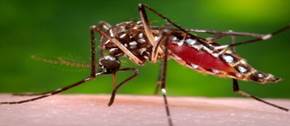Could the Zika virus come to Canada? To date, zero cases of Zika have been contracted in Canada through mosquito bites. All reported cases have been travel-related, sexually transmitted or transmitted from mother-to-child. You may be wondering if that could change. With its rapid spread in the Caribbean and the Americas and its international attention, this is a question that's top of mind for Canadian researchers, as they venture into uncharted territory in their Zika virus research.
Until now, Public Health Agency of Canada (PHAC) labs were studying mosquitoes in relation to endemic infectious diseases, like West Nile virus. While it's unlikely mosquitoes infected with this "tropical disease" can survive Canadian winter temperatures, PHAC scientists are investigating this question further.

First Zika research of its kind
PHAC's National Microbiology Laboratory (NML) and the Brock lab in Ontario recently launched research to determine if mosquitoes in Canada can acquire the slow-growing Zika virus and transmit it to humans, while surviving in Canadian temperatures. Though there are about 80 different types of mosquitoes in Canada, the experiments focus on those that are widespread and abundant, and frequently bite humans (some feed only on animals, birds and amphibians).
The studies began by obtaining an Asian strain of the virus from Thailand that circulated in French Polynesia during the 2013-2014 outbreak, as well as a strain from Puerto Rico, which is the same strain that is circulating in South America.
The scientists collected live mosquitoes in southern Ontario and Manitoba -- 2 areas that have ideal habitats for mosquito populations. The mosquitoes were trapped and brought back to the labs where they have been exposed to the Zika virus either through injection or by feeding them with Zika-infected blood.

Public Health Agency of Canada scientist collecting mosquitoes in the field.
Should the species be able to pick up the virus, researchers will be closely looking to see if the pathogens will travel through the insect's salivary glands, a key step for passing the virus to humans.
Canadian climate: a major factor
Climate is also a major barrier to the spread of the disease. As PHAC scientist Dr. Robbin Lindsay explains it, "Zika virus is primarily spread in mosquitoes in countries with tropical climates, and so we want to see the influence of cooler temperatures on the possible development of the infection."
Researchers will be monitoring the mosquitoes during the incubation period (time required for the virus to develop and reach the salivary glands for possible transmission) to see how varied temperatures affect the ability of the mosquitoes to become infected before they die. Often viruses cannot be maintained in mosquito populations for extended periods of time because of the cold temperatures. The mosquitoes usually die before the virus reaches their salivary glands. The hope is that Zika has these same poor growth patterns in Canadian mosquitoes exposed to typical Canadian temperatures.
So far so good! As of August 30, 2016, researchers at the NML have evaluated 6 mosquito species found in Canada. No evidence was found to indicate that these species can carry or transmit the Zika virus.
Once all the data has been collected, it will be used to update scientific models that predict where the climate is most suitable for the mosquitoes to transmit and acquire the disease. If applicable, risk maps will be developed to display where the possibility of local transmission is the highest. The modelling and risk mapping will be done in collaboration with climatologists at the Université de Québec à Montreal. Ultimately, this information will be used to determine the level of risk now, and in the future with a warming climate, to better protect Canadians.
Protect yourself always
While the research is still ongoing, the risk of contracting the Zika virus from mosquitoes in Canada remains very low. However, it's always a good idea to protect yourself from mosquito bites.
To learn more about Zika virus and how you can protect yourself, visit Canada.ca.
